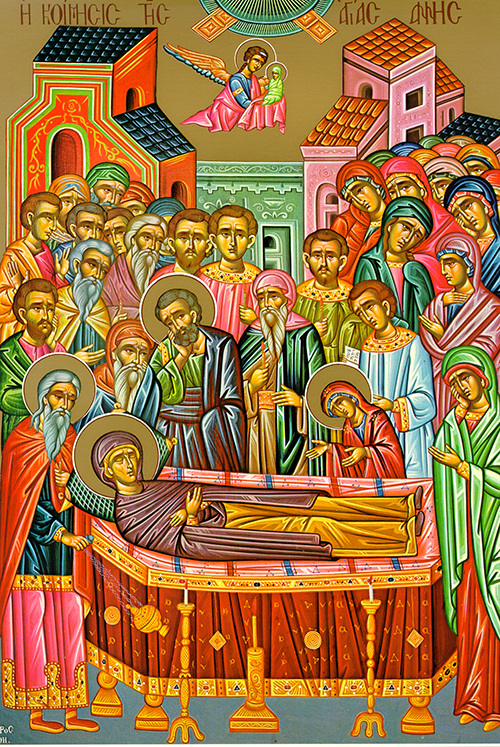

The Holy Anna was the daughter of the priest Matthan and his wife Mary. She was of the tribe of Levi and the lineage of Aaron. According to Tradition, she died peacefully in Jerusalem at age 79, before the Annunciation to the Most Holy Theotokos. During the reign of Saint Justinian the Emperor (527-565), a church was built in her honor at Deutera. Emperor Justinian II (685-695; 705-711) restored her church, since St. Anna had appeared to his pregnant wife. It was at this time that her body and maphorion (veil) were transferred to Constantinople.
Memory of the Holy Women Olympiada and Euphraxia at Nicomedia in Bithynia: Olympiada was a widow who, bereft of her husband while still young, passed the remainder of her life most piously in Constantinople among women devoted to God. She was a deaconess, first in the time of Patriarch Nectraius, and then under John Chrysostom. She assisted the poor and was also very faithful to St. John Chrysostom in his exile. Euphraxia went with her mother to Egypt, traveling around the monasteries and giving alms. She received a monastic habit and entered into deep ascetic discipline.
The Fifth Ecumenical Council was held in Constantinople in the time of the Emperor Justinian the Great in the year 553. All the Monophysite heresies were condemned at this council, as were the works of Origen (against the resurrection of the dead).
O holy Anna, you are filled with the wisdom of God, and you gave birth to the most pure Mother, the one who gave birth to Life. Therefore, you have been carried up in glory on this day to the blessedness of heaven, to the abode of those who exalt with joy. And now you pray, O ever-blessed one, for the forgiveness of sins for all those who honor you with all their heart.
Let us celebrate the memory of Christ’s ancestors, and fervently ask for their help so that, delivered from all affliction, we may cry out: O God, who glorified them according to your good will, remain always with us.
Galatians 4: 22-31
Brothers and sisters: Abraham had two sons, one by the slave girl, the other by his freeborn wife. The son of the slave girl had been begotten in the course of nature, but the son of the free woman was the fruit of the promise. All this is an allegory: the two women stand for the two covenants. One is from Mount Sinai, and brought forth children to slavery: this is Hagar. The mountain Sinai [Hagar] is in Arabia and corresponds to the Jerusalem of our time, which is likewise in slavery with her children. But the Jerusalem on high is freeborn, and it is she who is our mother. That is why Scripture says: “Rejoice, you barren one who bear no children; break into song, you stranger to the pains of childbirth! For many are the children of the wife deserted-far more that of her who has a husband!” You, my brothers and sisters, are children of the promise, as Issac was. But just as in those days sons born in nature’s course persecuted the one whose birth was in the realm of the spirit, so do we find it now. What does Scripture say on the point? “Cast out slave girls and son together; for the slave girl’s son shall never be an heir on equal terms with the son” of the one born free. Therefore, my brothers and sisters, we are not children of a slave girl but of a mother who is free.
Luke 8: 16-21
The Lord said to his disciples: “Ask and you shall receive; seek and you shall find; knock and it shall be opened to you. For whoever asks, receives; whoever seeks, finds’ whoever knocks, is admitted. What father among you will give his son a snake if he asks for a fish, or hand him a scorpion if he asks for an egg? If you, with all your sins, know how to give your children good things, how much more will the heavenly Father give the Holy Spirit to those who seek him.”
2 Corinthians 1: 1-7
Paul, by God’s will an apostle of Jesus Christ, and Timothy his brother, to the church of God that is at Corinth and to all the holy ones of the church who live in Achaia. Grace and peace from God our Father and the Lord Jesus Christ.
Praised be God, the Father of our Lord Jesus Christ, the Father of mercies, and the God of all consolation! He comforts us in all our afflictions and thus enables us to comfort those who are in trouble, with the same consolation we have received from him. As we have shared much in the suffering of Christ, so through Christ so we share abundantly in his consolation. If we are afflicted it is for your encouragement and salvation, and when we are consoled it is for your consolation, so that you may endure patiently the same sufferings we endure. Our hope for you is firm because we know that just as you share in the sufferings, so you will share in the consolation.
Matthew 21: 43-46
The Lord said to the chief priests and the elders of the people: “I tell you, the kingdom of God will be taken away from you and given to a nation that will yield a rich harvest. The man who falls upon the stone will be smashed to bits; and he on whom it falls will be crushed.” When the chief priests and the Pharisees heard these parables, they realized he was speaking about them. Although they sought to arrest him, they had reason to fear the crowds who regarded him as a prophet.
Icon courtesy of Jack Figel, Eastern Christian Publications – ecpubs.com
Wednesday, July 24 –